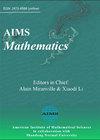基于球面q -线性丢番图模糊Dombi聚集信息和VIKOR方法的肝炎诊断策略
IF 1.8
3区 数学
Q1 MATHEMATICS
引用次数: 4
摘要
肝炎是一种以内脏组织炎症为特征的传染病,它是由肝脏感染或炎症引起的。人们常常担心肝炎是一种致命疾病,特别是在发展中国家,这主要是由于水污染、卫生条件差和危险的输血做法。虽然病毒通常被归咎于这种肝脏感染,但其他潜在的原因包括自身免疫性疾病、毒素、药物、阿片类药物和酒精。病毒性肝炎的诊断方法多种多样,包括体格检查、肝脏手术(活检)、超声或CT扫描等影像学检查、血液检查、病毒血清学检查、DNA检测和病毒抗体检测。本文提出了一种基于球面q-线性丢梵图模糊集(Sq-LDFS)的肝炎诊断决策支持系统。Sq-LDFS构成了所有现有模糊集概念的广义结构。在此基础上,在Sq-LDF信息下建立了一组新颖的Einstein聚合算子。同时,提出了一种改进的VIKOR方法来解决病毒性肝炎分类论证分析中的不确定性问题。给出了这些算子的一些有趣而有用的性质。本研究的核心是基于提出的Einstein聚合算子和改进的VIKOR方法来解决决策支持问题中的不确定性信息。最后,肝炎诊断的案例研究进行了检查,以显示建议的方法如何在实践中工作。此外,还提供了一个比较,以证明所建议的决策技术的优越性和有效性。本文章由计算机程序翻译,如有差异,请以英文原文为准。
A strategy for hepatitis diagnosis by using spherical $ q $-linear Diophantine fuzzy Dombi aggregation information and the VIKOR method
Hepatitis is an infectious disease typified by inflammation in internal organ tissues, and it is caused by infection or inflammation of the liver. Hepatitis is often feared as a fatal illness, especially in developing countries, mostly due to contaminated water, poor sanitation, and risky blood transfusion practices. Although viruses are typically blamed, other potential causes of this kind of liver infection include autoimmune disorders, toxins, medicines, opioids, and alcohol. Viral hepatitis may be diagnosed using a variety of methods, including a physical exam, liver surgery (biopsy), imaging investigations like an ultrasound or CT scan, blood tests, a viral serology panel, a DNA test, and viral antibody testing. Our study proposes a new decision-support system for hepatitis diagnosis based on spherical q-linear Diophantine fuzzy sets (Sq-LDFS). Sq-LDFS form the generalized structure of all existing notions of fuzzy sets. Furthermore, a list of novel Einstein aggregation operators is developed under Sq-LDF information. Also, an improved VIKOR method is presented to address the uncertainty in analyzing the viral hepatitis categories demonstration. Interesting and useful properties of the proposed operators are given. The core of this research is the proposed algorithm based on the proposed Einstein aggregation operators and improved VIKOR approach to address uncertain information in decision support problems. Finally, a hepatitis diagnosis case study is examined to show how the suggested approach works in practice. Additionally, a comparison is provided to demonstrate the superiority and efficacy of the suggested decision technique.
求助全文
通过发布文献求助,成功后即可免费获取论文全文。
去求助
来源期刊

AIMS Mathematics
Mathematics-General Mathematics
CiteScore
3.40
自引率
13.60%
发文量
769
审稿时长
90 days
期刊介绍:
AIMS Mathematics is an international Open Access journal devoted to publishing peer-reviewed, high quality, original papers in all fields of mathematics. We publish the following article types: original research articles, reviews, editorials, letters, and conference reports.
 求助内容:
求助内容: 应助结果提醒方式:
应助结果提醒方式:


